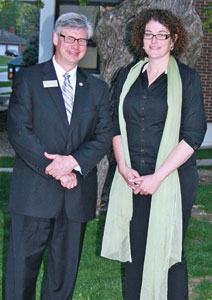 Americans like to think they live in a diverse country. And, of course, they do. But, as Hana Bendcowsky put it to a captive audience of about 100 the evening of March 27 at Avila University, think of having more than a dozen different religious and ethnic sects — divided among roughly 7 million people in all — living and trying to coexist in a space not much larger than the greater Kansas City metropolitan area.
Americans like to think they live in a diverse country. And, of course, they do. But, as Hana Bendcowsky put it to a captive audience of about 100 the evening of March 27 at Avila University, think of having more than a dozen different religious and ethnic sects — divided among roughly 7 million people in all — living and trying to coexist in a space not much larger than the greater Kansas City metropolitan area.
“It’s very hard to have dialogue,” said Bendcowsky, program director at the Jerusalem Center for Jewish-Christian Relations. “The situation makes it very hard. Both sides (Jews and Palestinians) see themselves as weak and the minority.”
It’s difficult, but not impossible. Bendcowsky, a Jew from Jerusalem, has made it her life’s work to reach out to people of all religions and engage them in interfaith dialogue. That’s what she was doing during a whirlwind two-day visit to the Kansas City area, where she dined with Avila University President Ron Slepitza, Ph.D., Jewish Community Relations Bureau|American Jewish Committee Executive Director Marvin Szneler, Director of Interreligious Affairs at JCRB|AJC Rabbi Alan Cohen and others and spoke at Avila and two other schools in the area before whisking off to her next engagement.
Bendcowsky’s visit was made possible by the Consulate General of Israel to the Midwest and co-sponsored by Avila University, Rockhurst University and the University of Missouri-Kansas City.
As Bendcowsky told her audience, she grew up in an Orthodox Jewish family. She knew nothing of any religions other than Judaism until she took a course in the New Testament at Hebrew University, the foremost university in Israel, where she eventually earned a Master of Arts degree in comparative religion. She said she didn’t meet her first Christian until she traveled to Jerusalem.
“I learned that Christianity was so connected (with Judaism) — in its culture, literature, music and politics,” Bendcowsky said.
The history behind the Jews’ migration to Jerusalem following World War II and the Holocaust made it difficult for Jews to trust or open themselves to Christianity, Bendcowsky said. Her Hungarian mother, a Holocaust survivor, felt as though she had to cross the street any time she approached a church in Jerusalem. She never knew why. For many Jews, the image of the cross brought back haunting memories and conflict.
Bendcowsky said there were two major topics that needed to be dealt with in engaging in interfaith relations. The first is dialogue. The difficulty there, she said, is that the two main groups — Jews and Christians — constantly argue about which group is the majority and which is the minority.
“We Jews know how to be the minority,” she said. “But we have to learn how to be a majority.”
“Christians in Jerusalem are wrapped up in victimhood. They don’t want to hear about the problems of others, the difficulties of the Jews.”
The second aspect is the century-old conflict of who gets to occupy the Holy Land. Opportunities to meet, talk and iron out differences are scarce, she said.
“It seems like there’s no hope,” Bendcowsky said. “But, of course, there is hope.”
That’s where her work comes in. Bendcowsky said she tries to promote peace and dialogue wherever she can. She leads tour groups in Jerusalem. She also moderates classes and encounter groups. Twelve schools for young children in the city — six Christian, six Jewish — talk with students constantly about identity and respecting differences. The center where Bendcowsky works also produces booklets in Arabic and Hebrew about the Christian community.
“It’s not enough just to tolerate the other, but to respect their differences,” Bendcowsky said. “The morality of a society is in how it takes care of the minority.
“All over the world, we still have a long way to go. We’re not going to change the world, but a lot of different little things can make a difference.”


